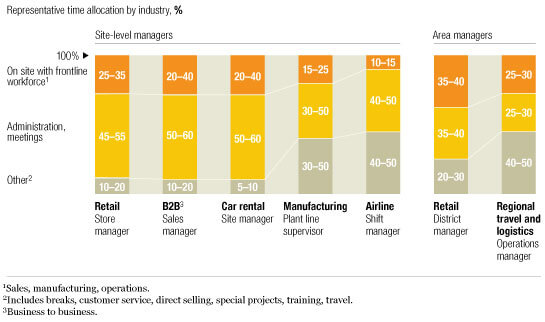
Following the latest fashion, Artificial intelligence is being applied to as many fields as there exist. Sooner or later, it’ll inject great vitality to every single one of them.
It may displace more than just entry-level work, taking over management roles.
Let’s find out what stands behind this statement and imagine the world with Artificial Intelligence in management.
WHO ARE AT RISK OF BEING SUBSTITUTED BY AI: SENIOR, MIDDLE OR FRONT-LINE MANAGERS?
Senior management: Board of Directors, CEO, the President
Senior managers provide strategy for their company, set overall tasks and goals.
By analysing data on a large number of companies – those which thrive and those which vanished – AI solutions could reveal pros and cons in a company’s current strategy.
Middle management
These are the bridge between senior and lower managers. Their role is to communicate strategy and company goals set by the top-level managers to the inferior ones.
In fact, the overall necessity of middle-level managers is questioned, especially in the IT age. Here are the two key reasons:
Managers are humans, which implies that by all means they perceive and interpret information subjectively. Also, some would add their own opinion and vision. All in all, the initial message would not be delivered unchanged.
Their primary role is to convey the strategy to lower managers – the task which can easily be solved by messengers, video conferences etc.
Information flow within a company should be fast, and today’s technology makes this possible. Moreover, with the advent of smart technologies, the need for such professionals is shrinking. AI would be more like a catalyst, not the cause.
Lower management: supervisors, front-line, team leads

These are directly involved in controlling the work of employees.
To realise the place of Artificial IntelligenceI in lower management, we should first discover what their actual duties are.
So, where does their time go?
As shown on the graphic above, much of the time managers are actually involved auditing for compliance with standards or solving immediate problems. Basically, at some companies, managers devote just 4 to 10 percent of their time — as little as 10 minutes a day — to coaching teams.
With these findings, we are certain to state that the work of lower management could be really changed to a more valuable one.
Artificial Intelligence in business management can take over the following:
– Controlling over the employees,
– Performing audit for compliance with standards,
– Calculating payments,
– Setting a schedule based on consumer demand.
To tell it simple, Artificial Intelligence for managers can become a powerful tool at their hands. As for redundancy risks – the position of middle management has been called into question for a past couple of years, and AI could fasten this process.
All in all, we can expect fewer mundane and administrative tasks.
Here comes the reasonable question – which tasks bosses must perform, if any?
MAJOR SHIFT IN MANAGEMENT: FROM MANAGING TO LEADING
Do you know the massive difference between a manager and a leader?
To put it in a nutshell, a manager is an occupation, an employee under the contract. They set goals, plan work, supervise tasks or people. So, their determination is to do the work right.
In their turn, a leader is not a job post. It is rather a role, or one may even say, a destiny.
They create vision, embrace challenges and inspire others. In contrast to managers, who focus more on building processes and structures, leaders place people at center stage. This makes them a company’s most valuable assets. They strive to do the right work.
Isn’t it somewhat consonant with our previous findings?

The high performing teams need both management and leadership go hand in hand. While AI would shoulder the administrative burden, today’s managers eventually have enough time to nurture people’s skills and develop talents.
And in this activity no software would ever be capable of displacing humans.
ALREADY EXISTING APPLICATIONS BASED ON ARTIFICIAL INTELLIGENCE FOR MANAGEMENT
In the last few years there has been a tremendous growth in the use of computer modelling to support managerial planning and decision making. According to a Wall Street Journal report, some of the world’s biggest companies like Uber, GE, and Shell use AI and Machine Learning to complete management tasks.
Here are a few of them:
The first app on this list was built under the assumption that managers have to spend an unprecedented large amount of their time on handling data. Harmon.ie uses AI to highlight only the most relevant communication threads and documents workers need to complete their tasks.
Textio uses ML techniques to help businesses write better job postings that are more likely to attract qualified candidates. Using data on 150 million job posts and outcomes, the app accurately predicts the success of the post.
A financial tech startup MioTech help to develop Artificial Intelligence based software for investment managers. They have already raised $7 million in funding.
3 BIG TAKEAWAYS
- Middle Management Endangered
Managers at any level can benefit from introducing AI software into their work. As for middle management, their overall necessity has been debated long before now. So it is rather a natural process than the consequence of AI adoption. - Shift From Management to Leadership
In short, the coming changes imply that managers would focus more on complex, high-profile tasks like employee development and innovative brainstorming. - Await for AI solution, or build your own
There are some AI software for managers on the market. But it’s never late to create one for your own.

